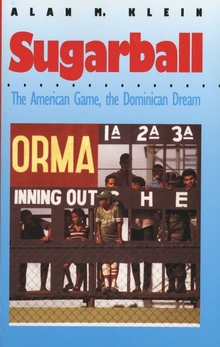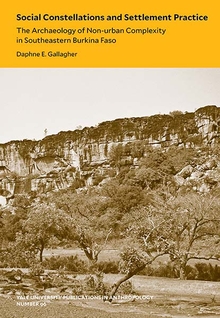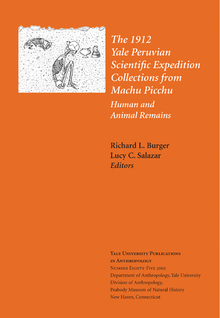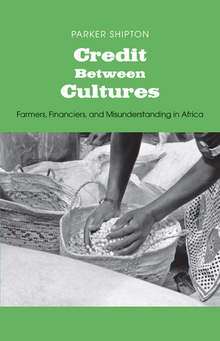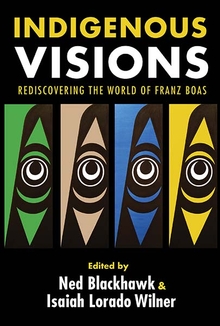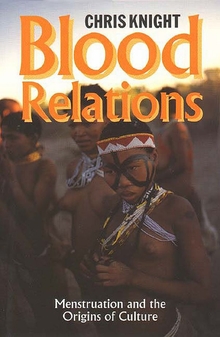Sugarball
WARNING
You are viewing an older version of the Yalebooks website. Please visit out new website with more updated information and a better user experience: https://www.yalebooks.com
The American Game, the Dominican Dream
Alan Klein
“To the average Dominican, baseball is a major source of cultural pride…‘When you’re born, the hospital puts a pink ribbon in your crib if you’re a girl, and a baseball glove if you’re a boy.’”—from the Introduction.
In the Dominican Republic baseball is not only a game but a national obsession. Exported from the United States and still controlled by it, the game is also a crucial arena of intercultural relations. Sugarball describes how Dominican baseball fosters national pride and competition with the United States while at the same time promoting acceptance of the North American presence in the country.
Alan M. Klein traces the introduction and development of baseball in the Dominican Republic, provides lively sketches of fans, stadiums, and players, and discusses such issues as the origin of the Dominican baseball academies and the growing international competition for Dominican players. Throughout, he evokes the wild enthusiasm that Dominicans have for the game and shows how it mirrors the conflict they feel between allowing and resisting American hegemony in their country. Klein relates the efforts of major league teams to seek talent in the Dominican Republic and shape the game to suit their own purposes—efforts that resemble other exploitative enterprises in the third world. These activities evoke little resentment, because for many Dominican young men baseball is the only way out of a life of unemployment or of hard labor in cities or cane fields. At the same time, their prowess at baseball encourages the Dominicans to oppose further interference from the Americans: having produced more major league baseball players than any other country apart from the Untied States, they feel they can make certain claims for the game as their own.
"An excellent short history of the Dominican Republic, the development of teams sponsored by the large sugar refineries (hence the book's title), and an absorbing analysis of how the Dominican national persona affects players and fans today."—Publishers Weekly
"Examining Dominican baseball, as anthropologist Alan Klein does in Sugarball, not only takes us inside an extremely poor country's national passion, but gives us new insights into the U. S. national pastime. . . . Klein's fascinating book is more than just a historical account or an anthropological case study. It is an examination of the complex reality of Dominican baseball and its connections to organized baseball in the United States. . . . Sugarball concisely traces the history of Dominican baseball, from the early days when teams were sponsored by the sugar mills, up through today, when young Dominican men see it as the launching pad for their dreams."—Milton Jamail, Miami Herald
"A fascinating book. It is not just a historical account or anthropological case study, but an examination of the complex reality of Dominican baseball and its connections to organized baseball in the United States."—Milton Jamail, Studies in Latin American Popular Culture
"In this academic work, anthropology professor Klein investigates the impact of baseball in the Dominican Republic. . . . Klein's book might prove to be valuable background for Don Zimmer."—Scott Powers, Chicago Sun-Times
"Sugarball analyzes where [the players] have come from, what they're up against, and the chances of their success, in the context of American pride and prejudice as embodied in baseball."—Adele Freedman, Toronto Globe and Mail
"This is an important book. It elevates sport sociology to levels heretofore rarely achieved, showing that this sub-discipline, still in it adolescence, is coming of age. Tackling issues as crucial as cultural resistance and hegemony, Alan M. Klein shows us how sport can be used to illustrate the tension between an industrial power and a developing nation. . . . In this slim, well-written and highly readable volume, we learn how the game of baseball reflects and obfuscates larger cultural dimensions. . . . For those looking for a highly textured, polyvocal ethnography of Dominican baseball, they will be pleased with the diversity of voices that are used throughout the text. . . . [Klein's] obvious command of the material and understanding of the focal concerns of Dominican players, we relish being taken on this journey with this knowledgeable guide. . . . In Chapter One, the reader is treated to an excellent, brief treatment of the history of baseball in the Dominican Republic. . . . Destined to take its place as one of the best critical ethnographies of sport, Sugarball is recommended reading for anyone interested in the role of sport in society, Latin American and Caribbean studies, qualitative methodology, and conflict theory."—Patricia A. Adler and Peter Adler, American Journal of Sociology
"Alan M. Klein provides a scholarly look at baseball in the Dominican Republic."—Bob Thompson, San Francisco Chronicle Review
"Offers us an opportunity to see how a radically different culture has embraced an American game. . . . Klein is interested in more than local color. In fact, what makes Sugarball so intriguing is that Klein sees baseball (which began as a seasonal diversion for sugar-cane cutters and grew in popularity as U. S. economic domination of the Dominican Republic increased) as a symbol of the country's uneasy battle against colonialism. . . . Klein's research is impressive, and his analysis of America's influence on Dominican baseball is provocative."—Patrick Goldstein, Los Angeles Times Book Review
"A carefully documented sociological study of the hegemonic relationship between the colonialism of United States baseball power and the resistance of Dominican béisbol romántico. . . . There is much of interest in the description of Dominican baseball history. . . . Sugarball pleases because of its thoughtful, progressive political readings of baseball's force in a society."—Eric Solomon, San Francisco Review of Books
"Sugarball serves as a reminder of the true meaning of the baseball term farm system."—Walter Shapiro, Time Magazine
"Sugarball is a fascinating account of baseball in the Dominican Republic. . . . On one level, Klein provides a history of the origin and growth of America's game—filled with interesting characters and telling anecdotes. On another level, he employs anthropological field methods to tease out the complex symbolic meanings baseball has for Dominicans. . . . By his creative use of techniques ranging from fan and player interviews, to content analysis of sports reportage, to counting the logos on baseball caps (American or Dominican) worn by fans, Klein clearly illustrates the Dominican Republic's love of baseball and its ambivalence toward the U. S., the country that created and exported the game. Although most appropriate for specialists, the book is well written enough to be of interest to the educated general reader as well."—Choice
"An absorbing sporting-cum-sociological look at the game of baseball in the Dominican Republic. The game is viewed with great ambivalence by Dominicans as being simultaneously representative of a US domination of their culture and yet a national passion and route to fame and wealth for some young men. . . . As a study of US cultural imperialism in the microcosm of sporting life in the Dominican Republic it is an interesting work and as a picture of baseball in that country should also appeal to baseball fans."—British Bulletin of Publications on Latin America, the Caribbean, Portugal & Spain
"Klein has pulled off a difficult task very well. . . . A major contribution toward the legitimization of the anthropology of sport."—Stephen I. Thompson, Journal of Anthropological Research
"In the first book-length treatment of this fascinating subject, anthropologist Alan Klein combines skillful ethnographic and historical analysis with the enthusiasm of a fanatico (as fans are called). . . . Sugarball provides a significant new dimension to our understanding of sports, immigration, and the Caribbean. . . . well-researched, readable, and provocative."—James Loucky, American Anthropologist
"Sugarball offers an adept analysis of the structure and organization of Dominican baseball and the hegemonic relationship of the major leagues to it. . . . Engaging and well written."—George Gmelch, American Ethnologist
"Klein . . . introduces readers to a concise history of the Dominican and skillfully paints a picture that describes the region's culture and people who struggle to resist American influence while maintaining a rigid sense of nationality. . . . Klein's study is a major contribution and rich in information that makes it ideally suited for courses in comparative cultures. In all respects, Sugarball lends itself to a better understanding of not only baseball in the Dominican, but Latin cultures at large."—Samual O. Regalado, Journal of Sport History
"This informative study is an exciting example of field work in the area of international cultural relations. It combines provocative, often moving, human anecdotal evidence with a solid theoretical framework. Especially valuable is Klein's convincing argument that baseball, like other forms of imported mass culture, can be in the recipient society simultaneously a vehicle for external hegemony/neocolonialism and a mechanism for internal resistance/nationalism."—Joseph L. Arbena, Professor of Latin American and Sports History, Clemson University
Publication Date: March 11, 1993

